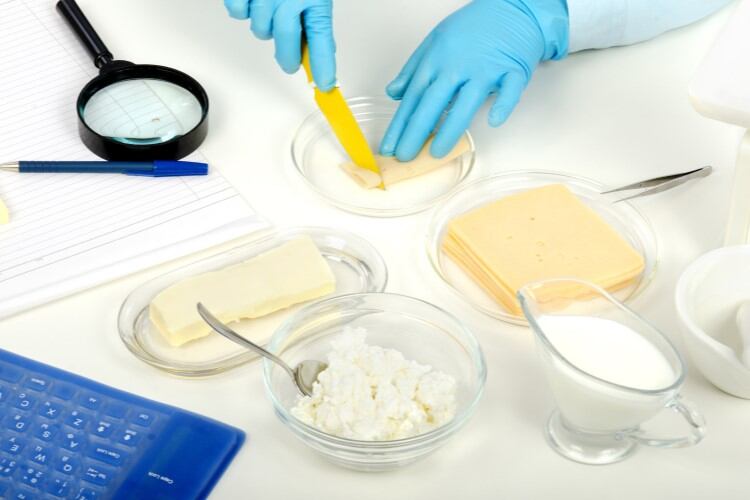Shoppers will give ‘a hard pass’ to synthetic biology used to make animal-free proteins and will instead focus on sustainably-raised and processed meat, dairy, poultry, eggs and seafood, the business has predicted.
Natural Grocers, which has a policy to not carry foods with genetically modified ingredients – such as cultivated meat and dairy. When it comes to lab-grown milk protein, the chain states ‘there are many unknowns about the health effects’ of this type of protein and its environmental impact. Instead, the grocer highlights regenerative agriculture as a production system that ‘puts animals back on the land and fits into a bigger ecological picture to actually help improve the environment while respective the lives of the animals…dairy from conventionally raised animals can’t hold a candle to regeneratively raised dairy, and neither can milk protein grown in a lab,’ Natural Grocers’ policy reads.
Existing research shows that US consumers are slow to warm up towards cultured meat. According to Van Loo, Caputo, and Lusk (2020), providing shoppers with information about the technology and the environmental advantages this food category offers had minor effects on the acceptance of cultured meat. Meanwhile, a Wilks, Phillips, Fielding and Hornsey (2019) study showed that a substantial group of respondents strictly opposed cultured meat, suggesting that provision of information on the benefits of these products would not necessarily improve attitudes. The same study concluded that the more unnatural respondents perceive cultured meat to be, the less positive their attitudes towards it were.
When it comes to animal-free dairy, a study that used focus groups to explore early-adopter perceptions of the precision fermentation process showed ‘the general consensus was a cautious openness to the idea of [animal-free dairy]. While precision fermentation differs from cell-cultured dairy, both represent a type of animal-free products.
“Outright opposition to the concept was rare, but so too was unabashed enthusiasm,” the authors concluded. “Lingering concerns about the role and impacts of genetic modification were present as well, and while analogies to beer brewing and other traditional forms of fermentation were seen as assuring for many, some still had their reservations, and could see how any mention of “genes” might be a deal breaker for other people in their social orbit.”
Meanwhile in the UK, where animal-free dairy cheese is not currently available for purchase, researchers Peter Slade and Oscar Zollman Thomas completed a study on consumer demand for cell-based cheese through a hypothetical experiment that considered possible market shares and the effect of pricing on consumer choice. The authors theorized that “a significant minority of consumers are willing to adopt animal-free dairy cheese if it is priced competitively with conventional dairy cheese: animal-free dairy has a conditional market share of 22% when priced at a 25% markup relative to premium dairy cheese.” Animal-free cheese’s share would jump to 33% if parity is achieved, they found, but slump to just 2% if the price of the lab-grown products are twice as high as conventional dairy.
Christie Pettys, Natural Grocers product standards manager (food), said: “If customers do not want lab-grown meat, then it tends to reason they also do not want lab-grown dairy products.
“We have observed that most customers have a gut reaction and feeling that the lab-grown ‘animal’ products feel unnatural, uncomfortable, and unnecessary.
“To put it simply, it’s accurate to say that the lab-grown food products creep people out.
“Additionally, because we have such robust animal welfare that puts an emphasis on treating animals with care and respect, our consumers know they can trust Natural Grocers and the actual animal products on our shelf to be raised and produced with dignity.
“Finally, as the lab-grown food products realm is so new it is uncharted territory and needs to be studied, regulated, and inspected before it is rolled out to consumers. Especially when it comes to labeling – these products should not be allowed to carry the same ‘milk’ label as milk that has come from a dairy cow. Customers deserve transparency when it comes to this purchasing decision.”
The labeling of dairy alternatives has come under scrutiny in many markets, including in the US where the Food and Drug Administration issued a draft guidance requiring manufacturers to include a ‘voluntary nutrient statement’ that conveys how the alternative product compares to milk. In Europe, Turkey banned the production of vegan cheese in 2022 and this year, Italy moved to ban lab-grown meat.
The meat and dairy industry have long advocated that improving production efficiency and adopting more environment-friendly farming practices, such as regenerative farming, could limit agriculture’s impact on the planet while allowing producers to keep up with demand.
Natural Grocers predict that in 2024, consumers will say ‘yes’ to organic and regenerative animal products.
Pettys commented: “Regenerative pasture-based dairy can demonstrate the value of organic regenerative farming practices where animals’ lives are based on pasture. That value created can be quantitatively measured in recovering soil health, cleaner waterways, the return of pollinators and birds, as well as sequestering carbon back into the soil.
“Putting animals back on the land instead of in a confined and fenced in dirt patch is the best and most effective way to regenerate grasslands and address climate change. Cattle have a natural symbiotic relationship to the land by eating the grass down so the roots are stimulated to grow, through their hoof action breaking up the soil, and their manure fertilizing the land.
“Through pasture-based regenerative methods, the cattle can regenerate dead land and bring it back to life. It’s as simple as that. Grasses from pasture are also the healthiest diet for the dairy cattle because they are meant to be eating grass and not corn, grain, and soy-based diets that cause them bloat, illness, and digestive issues but are cheaper and quicker feed options.
“The conventional methods of raising dairy cattle the last 70+ years have been more focused on increased milk volumes and dollars than on animal health or taking care of land, but regenerative pasture based dairy farming is focused on the long-term goal of keeping the land tenable (farmable) for the next generation of farmers and treating animals with care and respect.”
Natural Grocers also predicts that the Mediterranean Diet – which includes dairy, meat, whole grains, fish, fruit and veg, nuts and olive oils – is set to remain relevant.
Karen Falbo, director of nutrition education at Natural Grocers, said: “Our consumers are looking for healthy food sources of monounsaturated fats - olive oil, olives, avocados, etc.- quality sources of omega-3 foods such as salmon and sardines, humanly raised and sustainably produced meats and poultry, and pasture-based sources for dairy products and eggs.
“Each of these healthy foods fit into the Mediterranean diet. We’d also like to note that outside of allergies or intolerances, eating animal products is not at odds with a healthy diet whatsoever.”
The complete trends report is available in full via Natural Grocers.
Sources:
Framing the futures of animal-free dairy: Using focus groups to explore early-adopter perceptions of the precision fermentation process
Broad, M. G., et al
Front Nutr. 2022; 9: 997632.
Published online 2022 Oct 3
DOI: 10.3389/fnut.2022.997632
Review of factors affecting consumer acceptance of cultured meat
Pakseresht, A. et al
Published: Appetite, Volume 170, 1 March 2022, 105829
DOI: https://doi.org/10.1016/j.appet.2021.105829


